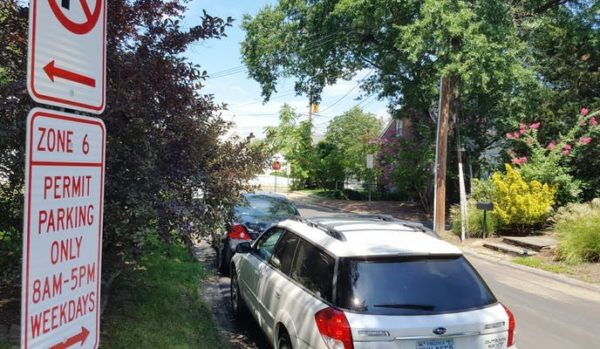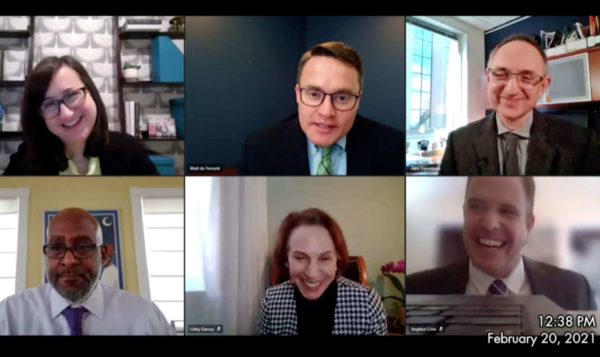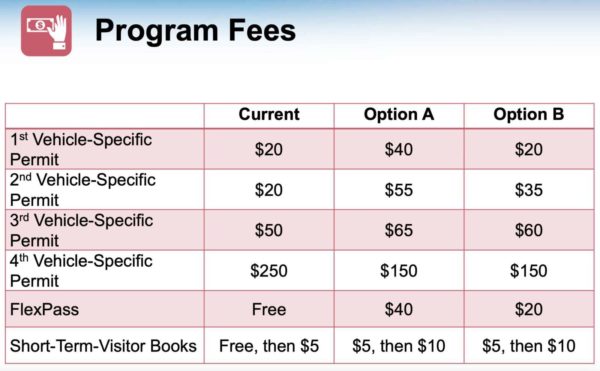Paid, two-hour parking will not be included in Arlington’s updated Residential Permit Parking program.
The County Board unanimously approved significant changes to the program during its meeting on Saturday.
The new program expands RPP program eligibility to multi-family buildings — excluding those approved via site plan — and grants permits to households based on how much off-street parking they have. Residents will be charged for some previously free permits, which according to the county, will end support for the program from general tax funding.
The Board ended up nixing a county staff recommendation to allow those from outside a neighborhood to pay for limited-time parking in zoned areas.
“Removing the two-hour [paid parking] is the big change that we have done,” Board Chair Matt de Ferranti said. “I was reading 196 pages of letters. We listened, and I think that is a big important step. Folks should hear that that is the biggest change.”
A county report and public letters indicate many residents pushed back on this specific proposal, which also divided members of the Planning Commission. County Board members cited enforcement challenges, given that vehicles without permits may actually be parked legally.
“Enforcement is too difficult right now,” Board member Libby Garvey said. Visitors will still be able to park in zoned parking if given a pass from an eligible resident.
While two-hour visitor parking was removed, Board members drew attention to the expansion of eligibility to multi-family buildings.
“One of the major reasons to reevaluate and reenact this program in Arlington [is] because it discriminates on the basis of housing types,” Board member Katie Cristol said. “I do feel confident that these amendments are going to make this program [fairer] and more consistent with our values in Arlington.”
She said the changes will leave the county better off than when the County Board repealed a RPP zone to put an end to a years-long dispute between Forest Glen and Arlington Mill residents, which pitted apartment dwellers over single-family home owners in an area with limited street parking.
The vote comes after a three year review of the program, during which new RPP applications were suspended. The program was originally established in 1972 to regulate parking in residential neighborhoods near Metro stations and commercial centers. Although the U.S. Supreme Court upheld the program in 1977, the program has been criticized recently for excluding people who live in apartments and condos.
About 10% of Arlington households are in current RPP zones, according to the county.
Public forums set for last spring were canceled due to the pandemic. Rather than reschedule them virtually, county officials concluded the review, citing equity concerns. A new period of public engagement began as the county geared up to propose the changes to the County Board in January 2021.
In December, the County Board deferred a public hearing until February to allow residents more time to look at the proposal.
Under the newly adopted program, all housing types can petition. However, those who live in residential buildings approved via site plan — as well as certain other types of mixed-use developments, plus Form Based Code developments along Columbia Pike — will be ineligible to apply for permits or petition for the program.
The county will require 80% of neighbors on a block to support a RPP petition, up from 60%. The county no longer needs to find that at least one-quarter of on-street parking is occupied by people from outside the area. Instead, it would need to find that more than 85% of spots are occupied.
“It’s really hard to tell what is an out-of-area vehicle,” county transportation official Stephen Crim said. “This out-of-area test is what causes many petitions to fail.”
Households with off-street parking are eligible for two annual permits (down from four), and households without it can get four permits.
For one permit, households can stick with the annual permit or opt for a FlexPass — a dashboard placard that residents and their visitors can use. All households can get up to five short-term visitor passbooks, which provide up to 300 days of parking each year.
The county will be charging for the FlexPass and the first book of short-term visitor passes. The first vehicle-specific permit or FlexPass is $40. The second, third and fourth vehicle-specific permits will cost $55, $65, and $150 respectively.
Low-income households that qualify for state and federal assistance programs will receive a 50% discount on passes.
Photos via Arlington County




